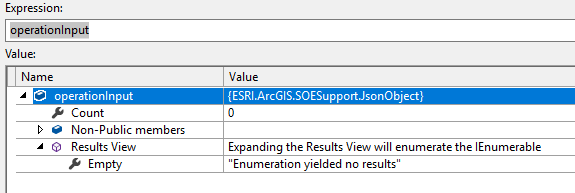- Home
- :
- All Communities
- :
- Products
- :
- ArcGIS Enterprise
- :
- ArcGIS Enterprise Extensibility Questions
- :
- Re: How to Send Parameter to SOE through HTTP base...
- Subscribe to RSS Feed
- Mark Topic as New
- Mark Topic as Read
- Float this Topic for Current User
- Bookmark
- Subscribe
- Mute
- Printer Friendly Page
How to Send Parameter to SOE through HTTP based services?
- Mark as New
- Bookmark
- Subscribe
- Mute
- Subscribe to RSS Feed
- Permalink
- Report Inappropriate Content
Hi,
I am having "Location" parameter where 'x' & 'y' value has to pass in SOE to process the request.Below is the C# code to access the SOE request.
// Create a request using a URL that can receive a post.
WebRequest request = WebRequest.Create("https://myServer.com:6443/arcgis/rest/services/ITDService/MapServer/exts/DistanceSOE/SpatialQuery");
// Set the Method property of the request to POST.
request.Method = "POST";
// Create POST data and convert it to a byte array.
string postData = "{\"Location\": {\"x\": 84.44902820440936,\"y\": 21.300696836245145}}";
byte[] byteArray = Encoding.UTF8.GetBytes(postData);
// Set the ContentType property of the WebRequest.
request.ContentType = "application/x-www-form-urlencoded";
// Set the ContentLength property of the WebRequest.
request.ContentLength = byteArray.Length;
// Get the request stream.
Stream dataStream = request.GetRequestStream();
// Write the data to the request stream.
dataStream.Write(byteArray, 0, byteArray.Length);
// Close the Stream object.
dataStream.Close();
// Get the response.
WebResponse response = request.GetResponse();
// Display the status.
Console.WriteLine(((HttpWebResponse)response).StatusDescription);
// Get the stream containing content returned by the server.
// The using block ensures the stream is automatically closed.
using (dataStream = response.GetResponseStream())
{
// Open the stream using a StreamReader for easy access.
StreamReader reader = new StreamReader(dataStream);
// Read the content.
string responseFromServer = reader.ReadToEnd();
// Display the content.
Console.WriteLine(responseFromServer);
}
It is going to SOE but could not able to read the "Location" Parameter and its values. PFB image for the same.


Can anyone let know, how parameters need to be send?
- Mark as New
- Bookmark
- Subscribe
- Mute
- Subscribe to RSS Feed
- Permalink
- Report Inappropriate Content
private RestResource CreateRestSchema()
{
RestResource rootRes = new RestResource(soe_name, false, RootResHandler);
RestOperation sampleOper = new RestOperation("sampleOperation",
new string[] { "Location" },
new string[] { "json" },
SampleOperHandler);
rootRes.operations.Add(sampleOper);
return rootRes;
}JsonObject parm1Value;
bool found = operationInput.TryGetJsonObject("Location", out parm1Value);
if (!found)
throw new ArgumentNullException("Location");
IPoint location = Conversion.ToGeometry(parm1Value,
esriGeometryType.esriGeometryPoint) as IPoint;when you call soe you an write similar code:
void Main()
{
Location location = new Location() { x = 100.3d, y = 500.9d };
JavaScriptSerializer js = new JavaScriptSerializer();
string jsonData = js.Serialize(location);
Dictionary<string, string> dictionary = new Dictionary<string, string>();
dictionary.Add("f", "json");
dictionary.Add("Location", jsonData);
Request.HttpPost("http://...../MapServer/exts/TestSOE/sampleOperation", dictionary);
}
internal class Location
{
public double x;
public double y;
}
/// <summary>
/// class request rest
/// </summary>
internal static class Request
{
/// <summary>
/// method http get
/// </summary>
/// <typeparam name="T">object T</typeparam>
/// <param name="url">url for get</param>
/// <returns>return object T</returns>
public static T HttpGet<T>(string url)
{
string result = Request.HttpGet(url);
var serializer = new JavaScriptSerializer();
var deserializedResult = serializer.Deserialize<T>(result);
return deserializedResult;
}
/// <summary>
/// method http get
/// </summary>
/// <param name="url">url for get</param>
/// <returns>return response</returns>
public static string HttpGet(string url)
{
HttpWebRequest req = WebRequest.Create(url) as HttpWebRequest;
req.Method = WebRequestMethods.Http.Get;
string result = null;
using (HttpWebResponse resp = req.GetResponse() as HttpWebResponse)
{
StreamReader reader = new StreamReader(resp.GetResponseStream());
result = reader.ReadToEnd();
}
////Request.CheckError(result);
return result;
}
/// <summary>
/// method http post
/// </summary>
/// <typeparam name="T">object T</typeparam>
/// <param name="url">url for post</param>
/// <param name="parameters">parameters post</param>
/// <returns>return object T</returns>
public static T HttpPost<T>(string url, Dictionary<string, string> parameters)
{
string result = Request.HttpPost(url, parameters);
var serializer = new JavaScriptSerializer();
var deserializedResult = serializer.Deserialize<T>(result);
return deserializedResult;
}
/// <summary>
/// method http post
/// </summary>
/// <param name="url">url for post</param>
/// <param name="parameters">parameters post</param>
/// <returns>return response</returns>
public static string HttpPost(string url, Dictionary<string, string> parameters)
{
HttpWebRequest req = WebRequest.Create(new Uri(url)) as HttpWebRequest;
req.Method = WebRequestMethods.Http.Post;
req.ContentType = "application/x-www-form-urlencoded";
string queryString = string.Join("&", parameters.Select(x => x.Key + "=" + HttpUtility.UrlEncode(x.Value)));
// Encode the parameters as form data:
byte[] formData = UTF8Encoding.UTF8.GetBytes(queryString);
req.ContentLength = formData.Length;
// Send the request:
using (Stream post = req.GetRequestStream())
{
post.Write(formData, 0, formData.Length);
}
// Pick up the response:
string result = null;
using (HttpWebResponse resp = req.GetResponse() as HttpWebResponse)
{
StreamReader reader = new StreamReader(resp.GetResponseStream());
result = reader.ReadToEnd();
}
////Request.CheckError(result);
return result;
}
/// <summary>
/// verifica se il result ha un messaggio di errore. Nel caso getta un'eccezione
/// </summary>
/// <param name="result">result da analizzare</param>
////private static void CheckError(string result)
////{
//// ErrorRest.ErrorRest error = JsonConvert.DeserializeObject<ErrorRest.ErrorRest>(result);
//// if (error.error != null)
//// {
//// string details = string.Join(",", error.error.details);
//// throw new Exception(string.Format("Error code: {0} - Messaggio: {1}{2}", error.error.code, error.error.message, string.IsNullOrEmpty(details) ? string.Empty : string.Format("- Dettagli: {0}", details)));
//// }
////}
}- Mark as New
- Bookmark
- Subscribe
- Mute
- Subscribe to RSS Feed
- Permalink
- Report Inappropriate Content
Thanks Domenico.. It helps!!